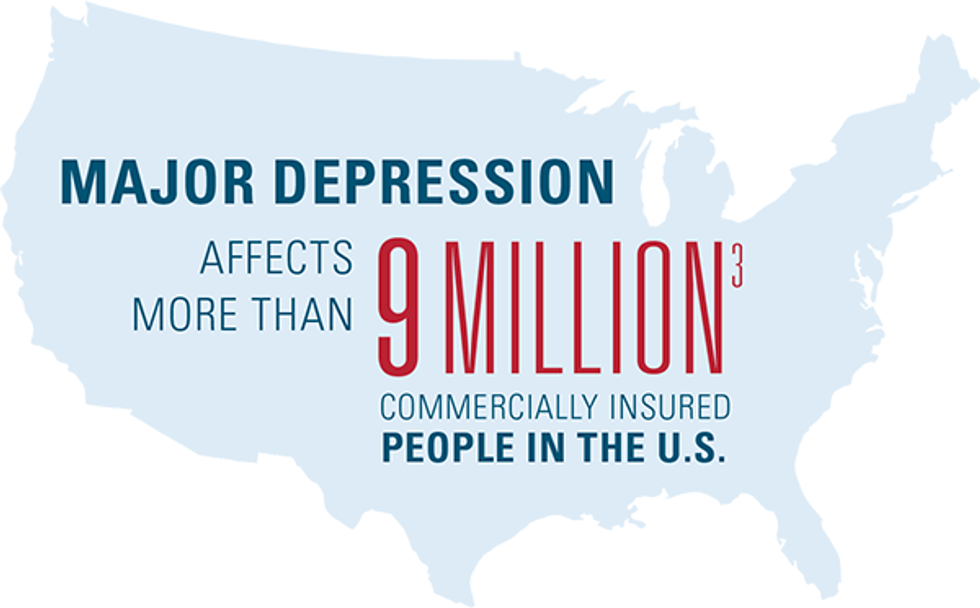The Oxford University Press' Living Dictionary defines depression as "a mental condition characterized by feelings of severe despondency and dejection, typically also with feelings of inadequacy and guilt, often accompanied by lack of energy and disturbance of appetite and sleep."
I'd, personally, like to thank the staff at Oxford University Press for their psychiatric definition that was actually more detailed than I expected.
Recommended for you

Unfortunately, I don't think that one definition can be exactly the same for every single person that has been diagnosed with depression. For myself, I actually do not have trouble sleeping. Instead, I sleep too much.
Lack of energy used to be a problem for me with depression. I have, slowly over time, learned to channel my depression from 'laying around' into 'go for a run'. I choose to be around people less though. I keep to myself more. I don't communicate as well, or often, with family or friends that I would typically speak to on a regular basis. When I do speak to people, it is short, simple, and to the point.
I definitely have a problem with my appetite when I am depressed. I have gone through stages where I have lost weight and gained weight while depressed. I am beginning to see when and where the differences lie. I lost approximately 30 pounds within 2 months when my ex-husband first left me in 2012.
Granted, I needed to lose weight, but that was not ideal. I stayed at that ideal weight for about 1.5 years and then slowly began gaining the weight back. I have had other times since then where I have been depressed but over-eaten and put on an excess amount of weight.
Most recently, when I had family members in the hospital, I began losing weight dramatically again. Not quite as dramatically as in 2012, but maybe close to 20 pounds lost over 4-6 months. I had already started a weight loss plan with my doctor a couple of months earlier, but I don't think I would have lost that weight as quickly if the health scares had happened with my family members.
The health scares made me constantly sad and I couldn't bear to think about my own health when I had family members whose health was at risk almost 24/7. I felt so selfish.
Stress and depression can go hand-in-hand as well. While being depressed about health scares, I have also had a lot put on my plate at work. I would feel like I couldn't stop for 5 minutes at work to eat something because I was so stressed about all of the extra things that I was doing and not being given the extra time that I needed to do those things.
I will admit that I have needed to lose weight for a while now. My doctor is working with me closely to help me get to my goal weight. This includes paying closer attention to what I am eating and my portions as well as slowly increasing my exercise regime. Finally, it includes adding a prescription weight loss medication to help curb my appetite.
However, there have been times when I have barely had to take this medication. During a bout of depression in 2017, I was so stressed and nauseous that I didn't need to worry about taking my medication. I lost 6 pounds alone just by constantly feeling sick 24/7 for about a week. It was so frustrating, and I knew I was doing it to myself, but I also felt like I couldn't do anything to change it.
As soon as I started thinking about why I was feeling that way in order to find a way to push forward, the sickness set in even harder than it did before.
The trouble with depression is having the strength to see it. Realizing that depression and anxiety have become a part of your daily life and now trying to find a way to live with it and work through it. Many people choose different ways to manage their depression such as medication, therapy, meditation, etc. All of which are good ideas.
There are so many options and things that you can do on a daily basis to help yourself. I chose medication for a while until I realized how to manage on my own without it. I also saw a therapist and a psychiatrist to help manage my thoughts and how to handle myself.
I will quickly plug that I believe that therapy is amazing for anyone and everyone. You do not have to be depressed or going through anything to see a therapist. I saw a therapist a few times just to be able to talk to someone other than my friends about my problems and get an outsider's point of view on topics and how to handle situations. It is very cathartic to be able to speak with someone who has no reason whatsoever to judge you and only wants to offer help and advice.
Going to therapy or seeing a psychiatrist are good places to start with depression. Speaking with a professional and being put on medications to get you to a good, steady point, and then working your way up and out from there. Once you are stable, then you can find things you enjoy in your daily life that will help to take your mind off of your depression or distract you from it long enough to calm you down.
I began to go jogging or exercising and listened to upbeat and motivating music while I did so. This helped energize me and give me a more positive outlook on life. Afterward, even though I was tired, I was ready to keep going and do more things or try new things. I then tried meditation on my rest days, then soon I was using meditation on an almost daily basis because I realized that it helped keep my temper at bay. The time I spent meditating helped me to realize that there was so much more detail to every situation and my reaction did not need to come so quickly.
Once you find one or two things that help build you up, then you can branch out and continue to try new things all while, possibly, weaning yourself off of medication (with your doctor's recommendation).
I tried a few different medications over a few years. After a while, I felt like I was stable enough to come off of all medications. I was also tired of spending so much time at doctor's offices and psychiatrist appointments that I felt like I was missing out on life. I decided to talk to my doctor about going off of medication, and since I had worked so hard to build myself up over the years, coming off of medication was, almost, a breeze.
There are always going to be times, as a person with depression and anxiety, that you question everything that you do. Coming off of medication was one of those things for myself. I worried that I would let myself go and become the person I was during my separation again. It was the scariest thought. It was also a thought that pushed me to keep myself up and moving on a daily basis.
Now, I am off of all my depression medications. I have been exercising more, trying to eat healthier, focusing on positive thoughts, and losing weight the right way. I have tried new kinds of crafts and artsy things. I have explored new areas in my neighborhood. I have traveled to new places, and sometimes alone. I have made new friends. I have dated. I have tried listening to all kinds of new music. I have gone to a few pretty cool concerts. I have gone to some fairs and craft shows.
There are so many things to do and opportunities to take advantage of in life. Depression puts a pretty big damper on those things. Getting through the forbidden forest that is depression and making your way out of it is so very hard; however, it is worth it in the end when you have learned so many things about yourself. Not just about new things that you like to do, but things like what triggers your depression or how to calm yourself down from an anxiety attack.
I am in no way trying to make light of depression because I truly understand that anchor that can weigh a person down. I still battle with depression and anxiety myself. I just try to look at it more positively than I used to, otherwise, it would eat me alive... again.
I am still constantly fighting for my own version of happiness. Depression is not an easy fix, mind you. Happiness is always a work in progress, and so am I.

















